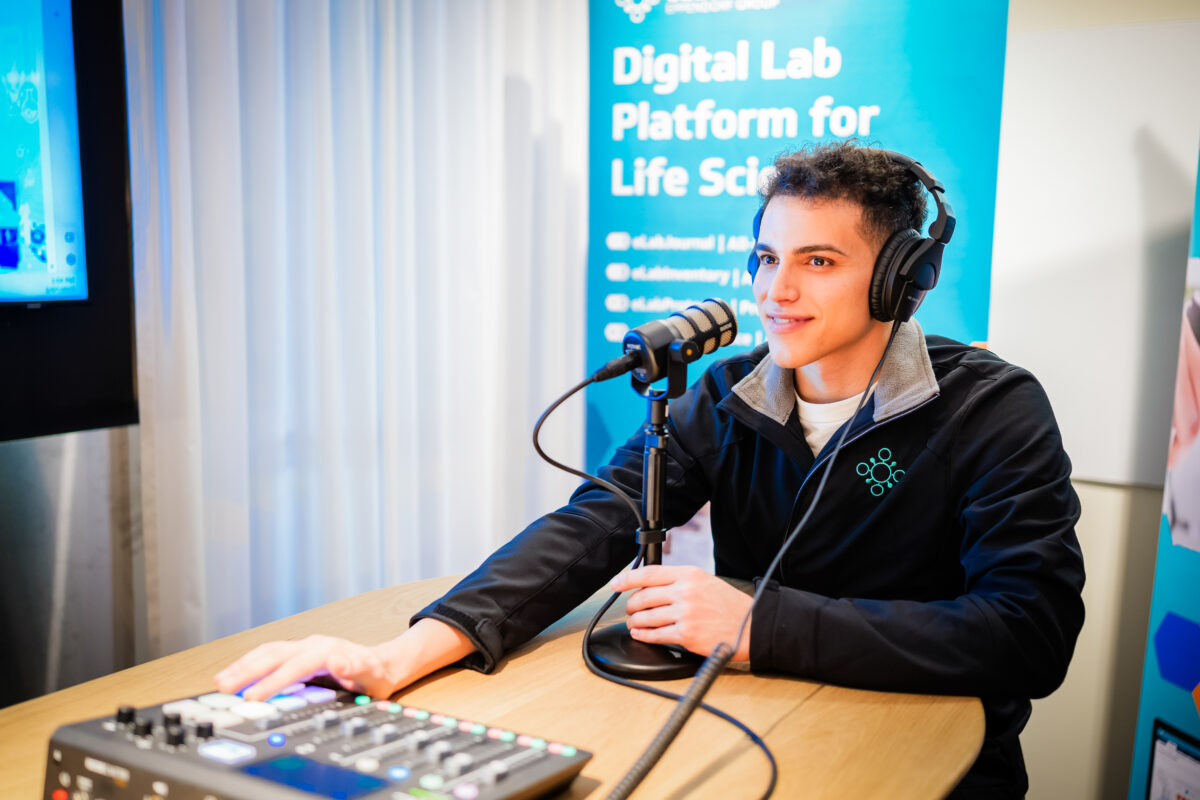

 By eLabNext
6 min read
06 Feb 2024
By eLabNext
6 min read
06 Feb 2024
At eLabNext, everyone on our team truly loves interacting with our customers. We’re not saying this to be cheesy, we simply “do what we do” to help your lab and organisation succeed, whether you are at the beginning of your digitalisation journey or have been using eLabNext for the past decade.
That’s why, when one of our customers, Ramzi Abbassi, Ph.D., joined the eLabNext team as a Lab Digitalisation Specialist, we were thrilled. Not only do we get to benefit from his scientific and digitalisation expertise, but we also get an in-depth understanding of what it was like to be a customer, which ultimately makes us better at supporting their needs.
“I’ve spent time in medical, life science, and engineering laboratories at the University of Sydney, University of New South Wales, and University of Oxford,” explains Ramzi. “As a member of the research support team at the Children’s Cancer Institute Australia (CCIA), I worked on ensuring institute-wide safety and compliance. These experiences have unveiled shared challenges that resonate within all of these distinct research communities.”
They also introduced him to the power of digitalisation, digital lab platforms, and, ultimately, eLabNext.
This week, we interviewed Ramzi to learn more about his background, insight into labs’ shared challenges with digitalisation, experience with eLabNext, and view on the future of lab digitalisation looks like.
Ramzi’s academic journey led him to the quirks and inefficiencies of using non-digital, legacy systems in the modern research world. Later in his career, during Ramzi’s work at the CCIA, he was tasked with identifying a solution to some deeply ingrained institute-wide challenges.
“The institute wanted to overcome some of the internal challenges with tracking compliance, mitigating risk with paper lab notebooks, and improving inventory and cold storage management,” explains Ramzi.
CCIA wasn’t the only organisation that Ramzi had seen experience these problems. Over the course of his Bachelor’s, Ph.D., and involvement with teaching and managing research operations, Ramzi has seen challenges fall into five distinct buckets.
Ramzi saw lab managers and supervisors dedicate considerable efforts to ensure appropriate access to data, equipment, and inventories. However, a streamlined digital approach to managing access control remains a relatively untapped opportunity.
Navigating the intricate landscape of research regulations and ethics committees’ requirements is a common challenge. Despite modern labs boasting cutting-edge instruments and technology, the absence of widely used digital platforms for managing safety protocols poses a collective hurdle.
The lack of secure and accessible audit trails, coupled with the inability to generate custom reports, particularly concerning chemical and biological hazards, leads to manual and error-prone management, resulting in potentially unsafe laboratories or practices,” says Ramzi.
Ramzi experienced the difficulties of mixed paper and digital record-keeping systems. Coexisting paper lab books and internal servers introduce inefficiencies and risks, with security concerns over non-digital records. Siloed electronic lab notebook systems compound the problem due to a lack of interoperability with research equipment, samples and limited customisation.
Ramzi also saw the absence of standardised protocols contributed to experimental inconsistencies and wastage. Ensuring that researchers consistently work with the latest approved versions of protocols is challenging due to the lack of a digital approval process.
For many labs, data loss, double ordering, and difficulty tracking samples in freezers (which can lead to reduced freezer longevity and increased energy expenditure due to door-open times) are all common problems.
“This resource wastage is a recurring issue exacerbated by the lack of transparency and inefficient non-digitised processes,” comments Ramzi.
As mentioned above, many of these problems have digital solutions. While Ramzi was working at the CCIA, he conducted a thorough exploration of various digital lab platforms and identified eLabNext as a solution that ultimately made laboratory operations more streamlined and efficient.
“eLabNext’s responsiveness, often within six hours despite the time zone difference between Australia and the EU/US, demonstrated a commitment to support,” Ramzi recalls. “The team facilitated online calls, guiding us through implementation, testing, and rollout, and remained receptive to incorporating changes we deemed necessary.”
A lot more factors also went into CCIA’s decision to choose eLabNext. For one, the platform offered a comprehensive suite, including eLabJournal, eLabInventory, and eLabProtocols, ensuring a holistic solution to CCIA’s diverse laboratory needs.
“eLabNext emerged as the optimal choice due to its strong cybersecurity measures, cost-effectiveness, responsive customer support, robust product roadmap, and commitment to interoperability,” adds Ramzi. “Its adherence to ISO 27001 standards, support for GxP compliance, focus on research integrity, and custom legal agreements were key factors that aligned perfectly with the institute’s requirements.”
Once eLabNext’s full suite of tools (eLabJournal, which includes both eLabInventory and eLabProtocols) was implemented at CCIA, eLabJournal enabled the improvement of data organisation and accessibility, compliance, collaboration and efficiency.
“Over time, the perception of the product only improved as its long-term benefits were realised, including enhanced research integrity, interoperability, and future connectivity with research hardware using Internet of Things (IoT) protocols,” explains Ramzi.
The seamless integration of eLabJournal with eLabInventory and the possibilities presented by eLabMarketplace were particularly impactful. The implementation challenges were effectively addressed with eLabNext’s support, including the advice for a phased rollout and easy setup and installation of a dedicated private cloud.
Ramzi’s transition from being a client of eLabNext to joining the eLabNext team happened when the CCIA requested an eLabNext support team member to be present in their geographical location. This request aligned with eLabNext’s strategy: To provide customer support in clients’ local time zones.
Ramzi ended up being the perfect fit for such a position.
“Being part of both sides of the equation has allowed me to connect with everyone I’ve encountered in my research career, from researchers to biotech founders in Australia,” Ramzi describes. “It’s been a fantastic opportunity to collaborate with those addressing real-world problems and to leverage my unique perspective to help eLabNext’s clients in Australia, New Zealand, and the greater Asia Pacific.”
As Ramzi continues to support eLabNext users with his digital and scientific expertise, he, along with the entire eLabNext team, is looking toward the future of lab digitalisation.
“In the short term, I envision lab digitalisation becoming increasingly integrated with AI and machine learning, enabling smarter data analysis and automation of routine tasks,” speculates Ramzi. “Innovations like eLabNext’s add-ons – Pipsqueak Pro, AI Protocol Generator, Immunomind, and mpVision, are already paving the way for more intelligent and efficient lab operations.” Further out, Ramzi thinks that lab digitalisation may evolve to encompass virtual labs and immersive technologies, transforming the way we conduct experiments and collaborate globally.
Eppendorf and eLabNext’s strategic vision to deepen their integration into the Eppendorf ecosystem heralds an epoch of synchronised research excellence, propelling laboratories towards heightened efficiency, collaboration, and a sustainable digital future of scientific exploration and innovation.
To learn more about lab digitalisation in Life Science and Biotech Research, check out this Eppendorf Lab Channel webinar, “Digitalisation in Life Science and Biotech Research.”

 By eLabNext
By eLabNext
Gain valuable strategies for choosing the right lab space, fostering collaboration, and achieving more with less money.
Read more
 By Zareh Zurabyan
By Zareh Zurabyan
From data quality to ethical considerations, learn how to navigate AI challenges while optimising integration for enhanced lab operations.
Read more
 By eLabNext
By eLabNext
Learn how to optimise lab procurement as part of a robust inventory management regime. Explore best practices and streamline lab ops.
Read more
Schedule a Personal Demo for friendly expert guidance and a free lab workflow assessment.